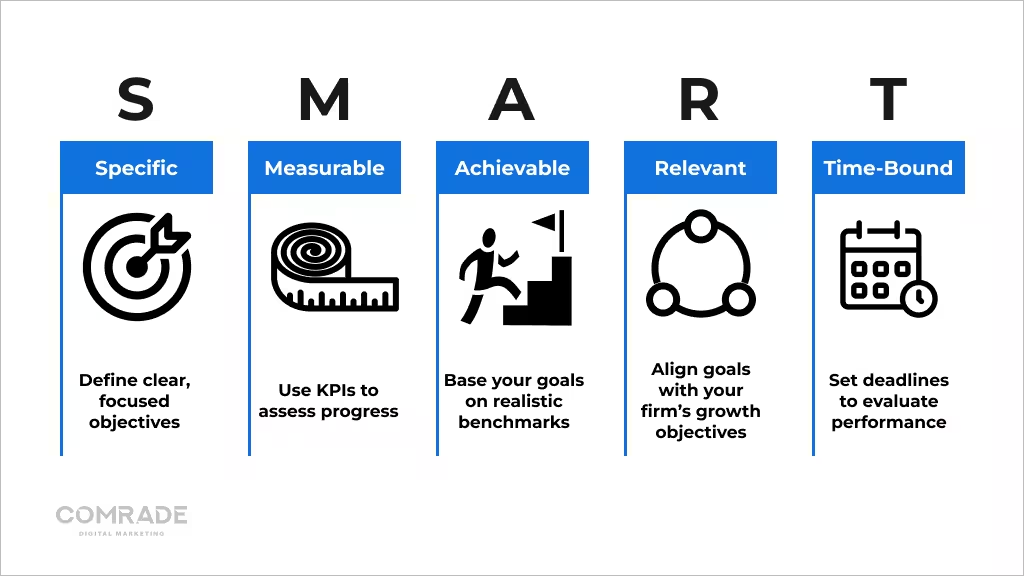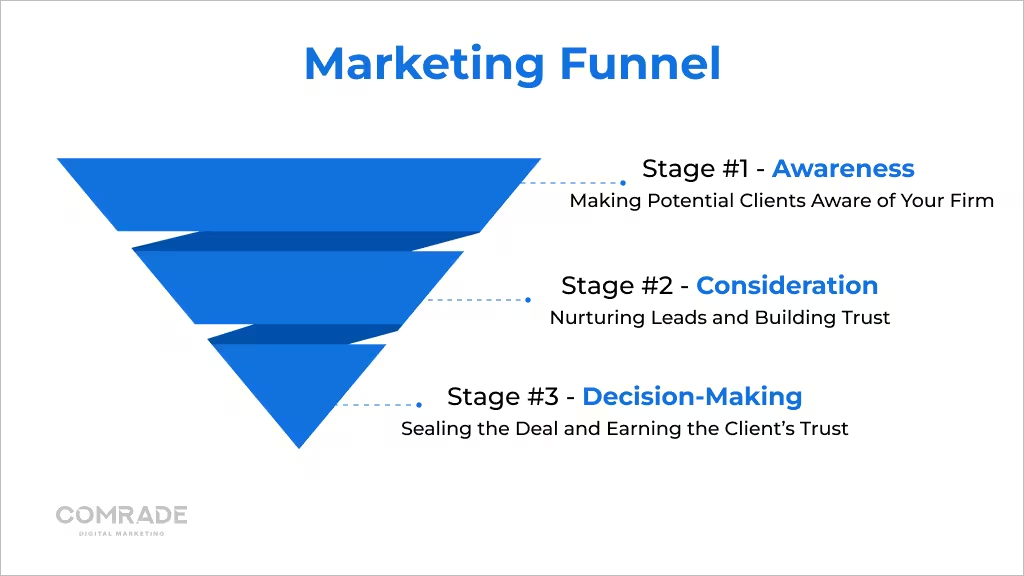Of course, we would say that! We can’t help ourselves. As a digital marketing agency, we want you to believe that cheap bullshit marketing never works because it makes us more money. But as the masters of this theatre of battle we call Digital Marketing, we have actual proof that cheap bullshit marketing simply Does. Not. Work. Period. And keep reading because we’re bringing the receipts.
We understand the justifiable frustration law firms experience with the ever-changing online marketing rules by Google and other search engines. The seemingly erratic and arbitrary algorithm modifications give us all headaches! Marketing your law firm can feel like navigating uncharted waters. As soon as you figure out where you’re going, a storm rages in and blows you off course, and then you have to start all over.
Many law firms struggle to balance investment and ROI. Many have never seen a kick-ass marketing strategy. All they know is that marketing in the digital space is costly and very competitive. Common challenges include underfunding, a lack of a clear plan, and struggling to find trustworthy marketing partners who are masters of this domain.
At Comrade, we’ve worked with over 300 law firms for years and know where the pain points are located. Whether it’s helping firms maximize limited budgets, clarifying their marketing strategy, or driving results with cutting-edge tools, our team delivers measurable outcomes.
Our receipts: We can achieve 3x ROI and do it all the time.
With our expert help, you can use this Playbook over the coming year to unshackle the challenges holding you back from dominating Google and, most importantly, your competition. Let’s enter the arena and begin the battle.

Marketing Strategy vs. Marketing Plan
A Marketing Strategy refers to the overarching, long-term approach a business takes to achieve its marketing goals, focusing on broad objectives like brand positioning, target audience, and key messaging. It outlines the 40,000-foot “big picture” direction, identifying which markets to enter, how to stand out from competitors, and what value the company aims to deliver. In contrast, a Marketing Plan is a more tactical and detailed roadmap that translates the strategy into actionable steps, including specific campaigns, budgets, timelines, and metrics for success. While the strategy defines the “what” and “why,” the plan focuses on the “how” and “when,” providing a clear guide for executing the strategy on the ground.
Find the top law firm marketing consultant transforming the legal landscape. Learn more now!
Comrade Digital Marketing Agency can help you with the above if you’re unsure how to go about it. Schedule a free consultation.
Budgeting and Success Metrics: Stop Guessing and Start Growing
Developing a clear, realistic marketing budget is critical for law firms aiming to grow and maximize their ROI. A detailed budget ensures efficiency and provides a roadmap for allocating resources to specific actions designed to create particular results, all according to your firm’s tailored marketing playbook. Here’s what this article will cover:
- Allocate a Marketing Budget That Drives Growth
- How to Implement a Winning Marketing Budget
- Measuring Success with Data-Driven Insights
- SMART Goals
- Tracking Results and Measuring ROI: Take Control of Your Marketing Data
Allocate a Marketing Budget That Drives Growth
Building a marketing budget that works isn’t just about throwing money at the latest marketing hack-of-the-day and hoping lightning strikes. It’s about investing in sustained growth, which means committing to your budget for the entire year. Also, a one-size-fits-all budget approach doesn’t work, either. Law firms vary widely in size, competition levels, and practice areas.
The key to success lies in consistency and patience—the “secret sauce” that makes a long-term strategy thrive. Quick wins are tempting, but true growth takes time, effort, and a steady hand. Allocate your resources wisely, and don’t cut corners. Here is a summary of budget levels to consider:
- Low Budget: Prioritize SEO and content marketing for sustainable growth.
- Moderate Budget: Add PPC and email marketing for immediate traffic and lead nurturing.
- High Budget: Include branding, remarketing, and video marketing for full-channel dominance.
Below are tailored recommendations to help you set a realistic marketing budget based on your firm’s unique circumstances. These numbers are based upon our expert opinion built by years of rigorous trial and error, testing and evaluating what works and what doesn’t:
| Firm Type | Monthly Budget Range | Recommended Marketing Channels |
| Solo Practitioners / Small Firms (1-2 lawyers in less competitive markets) | $2,500 – $5,000 | Local SEO, Google My Business optimization, blogging |
| Mid-sized firms (3-10 lawyers or firms in moderately competitive markets) | $5,000 – $10,000 | Comprehensive Local and Organic SEO, targeted Google Ads |
| Large Firms / Multi-Location Practices (Highly competitive or urban markets) | $10,000+ | Advanced PPC, remarketing, professional video content, social media marketing, email campaigns, multi-channel campaigns |
When it comes to your marketing budget, there’s no room for half-measures. As Robert Louis Stevenson famously said, “Compromise is the best and cheapest lawyer.” Settling is always a smart move for a case, but when it comes to your firm’s success, compromise means shortchanging yourself. You can’t afford to underfund your marketing and expect the same results.
Either commit the necessary resources to manifest a real impact on your long-term growth or get out of the kitchen. If you’re serious about standing out and attracting clients, don’t hold back—invest fully or rethink your strategy entirely.
How to Implement a Winning Marketing Budget
To truly make an impact, your budget needs to be a strategic tool, not an afterthought. It’s about aligning your financial resources with your firm’s goals, prioriti zing high-ROI activities, and staying committed to your plan throughout the year. The key to success isn’t just in the dollars you allocate; it’s in the discipline to follow through and adjust as needed.

1. Evaluate Your Firm’s Needs and Goals
Start by identifying what you want to achieve with your marketing efforts. Are you aiming for local dominance, expanding into new practice areas, or want to increase your quality leads significantly? Your job is to look at your firm from the 40,000-foot level and decide where you want to be at the end of one year. Given our vast experience, we can help you create this long-term vision for your firm. But ultimately, you’ll have to decide which path to take– one of mediocrity and compromise or the path to excellence and bold decisions.
Our job is to create a detailed plan of action that turns your goals into actionable steps. With a deep understanding of your firm’s unique strengths and challenges, we craft bespoke campaigns that align with your 40,000-foot vision and maximize your marketing budget. From content creation to SEO and social media to paid ads, we are experts at using the tools that drive measurable results.
2. Set Monthly Allocations
Break your yearly budget into easily achieved monthly spending targets and adjust as needed. This flexibility helps you respond to performance insights and refine your strategy, ensuring you don’t overspend in one area while leaving other opportunities untapped. By tracking monthly results, we can identify trends, pinpoint underperforming tactics, and quickly reallocate funds to the channels delivering the best ROI.
You’ll be free to optimize in real-time rather than being locked into a rigid plan. This dynamic approach allows you to stay nimble and adapt to changing market conditions, new competitors, or shifts in client behavior.
3. Focus on Performance Metrics
Regularly monitoring key performance indicators (KPIs) is crucial to ensure your marketing budget effectively drives results. These metrics provide insight into how well your budget is utilized and whether your strategies are paying off. Key KPIs to track include:
Cost-per-lead (CPL): This measures your spending to acquire a new lead. By tracking CPL, you can determine if you’re getting a good return on your marketing investment. If your CPL is too high, it could signal that you need to refine your targeting or improve your conversion strategies to get more value from each dollar spent.
Lead-to-client conversion rates: This metric tracks how many leads you generate into paying clients. A high conversion rate means your marketing efforts are not only attracting interest but are also effectively persuading potential clients to take action. If your conversion rate is lower than expected, it may indicate a need for adjustments in your sales process, client follow-up, or even the quality of the leads being generated.
Website traffic and engagement: Monitoring website traffic helps you understand how many people visit your site, while engagement metrics (such as time spent on the site, pages viewed, or bounce rate) show how effectively your website is holding their attention. Increased traffic with low engagement could indicate that your site needs better content, clearer calls-to-action, or more engaging visuals to convert visitors into leads.
Unlock the power of digital marketing for law firms and watch your practice grow – dive into our latest post!
Measuring Success with Data-Driven Insights
An effective marketing budget is only as good as your ability to measure its results. To ensure your marketing efforts deliver tangible outcomes, adopting the SMART principle for goal-setting and using key performance indicators (KPIs) like lead generation, cost-per-lead, and conversion rates to track progress is essential.
SMART goals provide a clear framework for keeping marketing efforts focused, measurable, and aligned with your firm’s objectives. Without SMART goals, your marketing strategy risks becoming aimless, making it impossible to gauge success or make improvements. Follow these steps to create SMART goals that drive results:

1. Specific
Define clear, focused objectives.
Example: “Increase website inquiries by 15% within three months through local SEO.”
2. Measurable
Use KPIs to assess progress.
Example: Track cost-per-lead, conversion rates, and client inquiries.
3. Achievable
Base your goals on realistic benchmarks.
Example: Compare your metrics to industry standards or previous campaign performance.
4. Relevant
Align goals with your firm’s growth objectives.
Example: “Boost visibility in the personal injury market to increase case volume.”
5. Time-Bound
Set deadlines to evaluate performance.
Example: “Achieve a 10% increase in website traffic within 90 days.”

Tracking Results and Measuring ROI: Take Control of Your Marketing Data
Tracking results is the backbone of data-driven decision-making. With proper tracking, law firms can identify which strategies are working, which need adjustment, and where to allocate resources for maximum return on investment (ROI). This is where the experts come in. Most lawyers don’t have the expertise or time to learn and track data daily. But we do. Here are just a few of the ways we provide value to our clients:
- Monitor website traffic, user behavior, and lead sources with Google Analytics
- Use a CRM system to track client interactions from inquiry to closed case
- Track CPL, conversion rates, and CLV over time to identify trends
- Refine strategies based on high-performing channels
- Create detailed reports on campaign spending, lead sources, and conversion tracking.
These are just a few basic things a competent marketing agency should do. If your current agency isn’t performing these analytics daily, then you need to politely show them the door. They need to understand that there’s a consequence for underperforming.
Ready to grow your practice? Learn how to get clients as a lawyer with our comprehensive guide.
Target Audience Identification
In today’s highly competitive legal landscape, identifying and understanding your target audience is paramount to crafting an effective marketing strategy for your law firm. With a growing reliance on digital platforms, including Google Ads, social media, and over-the-top (OTT) services, it’s more important than ever to ensure that your marketing dollars are spent efficiently by reaching the right people at the right time. Proper audience identification not only maximizes your marketing ROI but also strengthens client relationships and builds brand credibility.

The Importance of Audience Segmentation
Audience segmentation is the cornerstone of any successful law firm marketing strategy. Law firms typically serve various types of clients, whether it’s individuals seeking personal injury representation or businesses requiring corporate legal services. Therefore, a one-size-fits-all approach to marketing is insufficient. Segmenting your audience allows you to tailor your messaging and media channels to specific groups, making your marketing more relevant and impactful.
One of the first steps in audience segmentation is defining clear audience categories. For example, in personal injury law, key segments might include individuals who have been involved in car accidents, medical malpractice victims, or families impacted by wrongful death. Each group has unique needs, concerns, and search behaviors, which should be reflected in the law firm’s messaging.
This is where customer personas—detailed, semi-fictional representations of your ideal clients—come into play.
By understanding these personas, you can craft more personalized ad copy and content that resonates with each audience segment’s pain points, goals, and challenges.
Understanding Demographics and Using Demographic Filters
A fundamental aspect of audience segmentation is the consideration of demographics—age, gender, income, education, and geographic location. For instance, a law firm that specializes in estate planning might target older adults who are preparing for retirement or dealing with aging parents. Alternatively, a law firm focused on family law could use demographic filters to reach individuals of childbearing age or those in the process of getting divorced.
Platforms like Google Ads and social media allow marketers to apply demographic filters that refine targeting.
By narrowing your audience based on these filters, you can ensure your law firm’s advertisements are displayed to individuals who are more likely to require your services, increasing the chances of converting leads into clients.
Leveraging Search Intent and Keyword Selection
Search intent—the reason behind a user’s search query—is a crucial consideration when identifying your target audience for online advertising campaigns. A person searching for terms like “best lawyer for car accident in [city]” is likely to be in immediate need of legal services, presenting an ideal opportunity for conversion. Therefore, it’s vital to focus on keywords that align with the user’s intent. In Google Ads campaigns, keyword selection plays a crucial role in reaching the right audience.
By conducting thorough market analysis and using tools like Google Keyword Planner, you can identify high-converting keywords that match the types of cases you handle.
These keywords should be integrated into your ad copy, website content, and landing pages to improve visibility for individuals actively searching for legal services.
Crafting a Core Message for Each Audience Segment
Once you have identified your key audience segments, it’s time to develop a core message that resonates with each group. This message should address their specific pain points while reinforcing the unique value your law firm offers. For example, a personal injury law firm may focus its messaging on empathy and understanding, acknowledging the physical, emotional, and financial toll an injury can take on an individual’s life. Meanwhile, a corporate law firm may highlight its expertise in navigating complex business challenges, emphasizing its experience in regulatory compliance or mergers and acquisitions.
The Role of Video Content in Law Firm Marketing
Incorporating video content into your law firm marketing strategy is another powerful tool for reaching and engaging your audience. Videos allow you to present your law firm’s services in a more dynamic, relatable way.
Video content is particularly effective in building trust, as it provides a face to the law firm and fosters a connection with viewers.
When targeting specific audience segments, video ads can be especially useful on OTT platforms like YouTube, where you can target users based on their search history, viewing habits, and demographic data. This level of granularity ensures that your video content is seen by individuals who are more likely to need your services. Ultimately, the more you understand your audience, the more effectively you can tailor your marketing efforts. With a clear target audience in mind, law firms can increase their visibility, drive qualified traffic to their website, and improve client conversion rates.
Dominate search results by partnering with a law firm marketing agency for SEO expertise.
Law Firm Marketing Channels to Get the Job Done
Now that you understand marketing strategy vs. a marketing plan and how to create and measure both, let’s talk about the tools you can use to get the job done. There are many marketing tools available to get paying clients in the door. But, not all marketing channels are equal. In choosing which channel to spend your precious marketing budget, focus on your firm’s defined goals and that 40,000-foot view.

1. SEO
Any firm can use SEO, regardless of type, size, or location. However, spending marketing dollars on optimizing general search terms may be more helpful for large to mid-range law firms that want a national or regional reach.
2. Local SEO
Smaller law firms may have a better ROI by using Local SEO channels to get leads. Depending upon the type of desired case, local SEO may be where most of your small firm’s marketing budget is spent. For example, a small real estate law firm or family law practice wouldn’t want to spend money advertising for clients from across the state.
3. Search Advertising
Search advertising is a more direct way to reach leads than SEO. With a pay-per-click (PPC) advertising campaign, you pay a set amount each time an online visitor clicks on your ad. With PPC, you can track which ads do well and which ads you should dump. However, if managed poorly, a PPC campaign could cost a lot of money with very little in return. You can use Google Ads, including Google’s local service ads.
4. Website
There’s no sense in spending all this money and energy on SEO content and PPC ad campaigns without a proper rally point where to send all the leads. A user-friendly website full of sought-after information is the cornerstone of your online marketing structure. Your website should be quick to load and easy to navigate. It also must be mobile-friendly, given that most people will come to your firm through their smartphones. Last, your website should be consistently updated with new and engaging information that will feed the search engine bots.
5. Social Media
Let’s face it, social media is where the party’s at. If you want to find potential clients, go to where they’re hanging out– TikTok, Instagram, X, Facebook. But don’t just post things on social media haphazardly. First, develop a plan. Combining social media marketing with PPC ad campaigns can help you reach new clients for a relatively low cost. It can build a community around your firm and increase your brand awareness if done wisely.
6. Brand Building
In building a brand, you must first determine who you are as a law firm. This may involve some serious soul-searching and 40,000 feet analysis and decision-making. A well-crafted brand helps communicate the firm’s values, expertise, and unique approach, making it easier for potential clients to recognize and connect with the firm. It can also establish credibility and authority, especially in specialized practice areas, by positioning the firm as a leader in its field. A brand identity should encompass everything from the client experience to the law firm’s visual identity (firm logo). This creates consistency and strengthens long-term client relationships, increasing retention and referrals.
Marketing Funnel Development
By using the right combination of marketing tools—such as PPC advertising, SEO, email newsletters, and more—law firms can build a system that nurtures leads and turns them into long-term clients.

Stage 1: Awareness – Making Potential Clients Aware of Your Firm
The first stage of the marketing funnel is client awareness. At this stage, potential clients don’t yet know about your law firm or the legal services you offer. Your goal here is to cast a wide net and introduce your firm to as many prospects as possible.
To build client awareness, law firms can use a variety of marketing channels to reach a broad audience. PPC advertising, particularly Google Ads, is an excellent tool for attracting individuals who are actively searching for legal services. Through PPC, law firms can target highly specific keywords based on the types of cases they handle, such as “personal injury lawyer” or “family law attorney.” This enables you to display your ads to people who are looking for help, driving traffic to your website.Additionally, social media platforms like Facebook, Instagram, and LinkedIn can play a critical role in client awareness. By posting engaging content, sharing legal insights, and using paid ads, you can introduce your firm to potential clients who might not yet be searching for legal services but are still interested in your area of law.
Stage 2: Consideration – Nurturing Leads and Building Trust
Once potential clients are aware of your law firm, the next step in the marketing funnel is to encourage them to move into the consideration stage. In this phase, prospects are evaluating whether your firm is a good fit for their needs, and it’s important to nurture these leads through targeted content and follow-up strategies.
One of the most effective tools for nurturing leads is an email newsletter. This allows law firms to stay top-of-mind with prospects by regularly sending valuable content, such as legal insights, case studies, client testimonials, and updates on your firm’s successes. By sending periodic email newsletters, you can engage prospects, educate them about your legal expertise, and subtly guide them toward the next step in the decision-making process.At this stage, mobile-friendly law firm websites become crucial. Since most people now browse the web via smartphones, ensuring that your website is optimized for mobile use is essential. A responsive and user-friendly website will keep prospects engaged, making it easy for them to access information about your services, read client reviews, and ultimately take action by scheduling a consultation.
Stage 3: Decision-Making – Sealing the Deal and Earning the Client’s Trust
The final stage of the marketing funnel is decision-making, where potential clients are ready to choose a law firm. At this point, your goal is to remove any remaining barriers to conversion and make it as easy as possible for prospects to hire your firm.
In the decision-making phase, your marketing efforts should focus on trust-building and presenting compelling reasons to choose your firm. This is where PPC advertising and SEO strategies can complement each other. By ensuring that your firm ranks high on relevant search queries and continues to appear in front of prospects via paid ads, you can increase the likelihood of conversion.
Having clear calls to action on your website is essential in this phase. Prospects should know exactly what to do next, whether it’s scheduling a consultation, filling out a contact form, or calling your office. Highlighting special offers, such as a free initial consultation, can also motivate leads to take action sooner rather than later.Moreover, market analysis at this stage can provide insights into how clients are interacting with your website and which pages they spend the most time on. By analyzing these behaviors, you can optimize your site to make the decision process even smoother for potential clients, perhaps by emphasizing client success stories or detailing your firm’s experience with the specific legal issue at hand.
Discover the power of SEO for lawyers and unlock your website’s full potential.
Integrating the Funnel with Your Marketing Strategy
To develop an effective marketing funnel, law firms must integrate their funnel stages with a comprehensive marketing strategy. Each channel used—whether it’s PPC advertising, SEO, email newsletters, or content marketing—should serve the overall goal of guiding prospects from client awareness to a hiring decision by the client. A cohesive strategy ensures that potential clients receive the right messaging at the right time, nurturing them through the funnel until they’re ready to take action.Additionally, lead generation tools such as landing pages, form captures, and chatbots can enhance the client journey by allowing prospects to engage with your firm immediately. These tools can collect information from leads, enabling your team to follow up quickly and personally, further accelerating the conversion process.
Continuous Optimization: Refining the Funnel Over Time
Building a marketing funnel is not a one-time effort but an ongoing process. Law firms should continually test and refine their marketing strategy to improve performance. Analyzing data from your PPC advertising, email campaigns, website interactions, and lead-generation tactics will help identify areas for improvement.
By continuously optimizing your funnel, you can ensure that your firm is always attracting, nurturing, and converting leads more efficiently.
Attract more clients and grow your law firm with PPC for lawyers. Learn the strategies now!
Stop Competing, Start Dominating—Let’s Build Your Winning Strategy!
Ready to take your law firm to the next level in 2025? Don’t let your competitors outshine you on Google—now’s the time to implement the strategies that will drive more traffic, generate high-quality leads, and establish your firm as THE authority. The future of law firm marketing is here—are you ready to dominate? Contact us today to schedule a consultation and start building your success!

